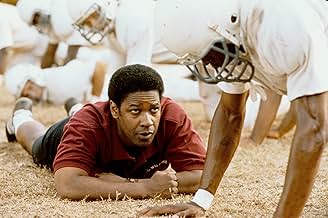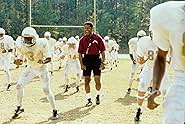L'histoire vraie d'un entraîneur afro-américain et de son équipe de lycéens lors de leur première saison en tant qu'entité multiethnique.L'histoire vraie d'un entraîneur afro-américain et de son équipe de lycéens lors de leur première saison en tant qu'entité multiethnique.L'histoire vraie d'un entraîneur afro-américain et de son équipe de lycéens lors de leur première saison en tant qu'entité multiethnique.
- Récompenses
- 8 victoires et 17 nominations au total
Earl Poitier
- Blue Stanton
- (as Earl C. Poitier)
David Jefferson
- Cook
- (as David Jefferson Jr.)
Preston Wigasi Brant
- Jerry Buck
- (as Preston Brant)
John Michael Weatherly
- Kirk Barker
- (as Michael Weatherly)
Histoire
Le saviez-vous
- AnecdotesAccording to Coach Herman Boone in an article published by ESPN, he really did integrate the buses before they left for football camp. Boone said "I forced them on each other, I forced them to learn each other's culture. I forced them to be a part of each other's lives."
- GaffesDuring a game sequence, an opposing running back runs a sweep. He fumbles the ball which is picked up by a Titan player, who runs it in for a touchdown, the wrong way.
- Citations
Coach Boone: I don't scratch my head unless it itches and I don't dance unless I hear some music. I will not be intimidated. That's just the way it is.
- Crédits fousHome movies are shown of each person, when they state what happened to them after the '71 season.
- Versions alternativesIn 2006, a director's cut was released on DVD. That version runs approx. six minutes longer.
- Bandes originalesThem Changes
Written by Buddy Miles (as George Buddy Miles)
Performed by Buddy Miles
Courtesy of The Island Def Jam Music Group
Under license from Universal Music Enterprises
Commentaire à la une
Being a former white athlete and coach I am sick of sports movies where the story involves a team eventually winning a championship so I passed this one by when it first came out. Big mistake!! Like "Hoosiers" this one was an exception and what an exception. Remember the Titans is in my top five movies of the past ten years. Denzel Washington, as the coach, gave another of his consistently outstanding performances.
Like "Hoosiers" this is a true story and it is not just a story about sports but a strong story about race. I probably appreciated it more than most because of my background I connected to the movie. During the 1940s I attended schools which were well integrated and students of different races and cultures existed harmoniously. To a large degree, it was because the high school had a very successful football program in which unlike almost all of the other schools, minority athletes were welcome. In my junior year we went undefeated and won the State Championship and the team is still considered the best high school team of all time. The only time the team came close to defeat was in the State final when we played another well integrated team.
Consequently the community while generally middle and upper class except for its minorities was well integrated. As a result although I knew racism existed, I never encountered it in my community. But then I began to see its ugly head. First, the All-American end on our team, a superb athlete, was denied scholarships both to USC and Stanford because neither school accepted minorities. I had always wanted to go to USC but because of what USC did to my friend I turned down its offer of a scholarship the next year as I did to Stanford which I considered a snob school then as I do today.
But my college was cut short when the Korean War began and I was in the service. I was sent to bases in the South and I spent much of the next thirteen years in the South witnessing how bad it was for the blacks and I was involved in the civil rights movement in the South which got me into a lot of trouble with my military superiors.
During my tours in the South I became head coach of a football team at a Southern base. Filled with ex-collegiate stars and some pros, we regularly played Division I colleges and universities. However, because I had black players on my team I couldn't schedule games with any white southern colleges. Instead we scheduled one black college and several state universities in the mid-west.
Some critics have compared the summer camp at which Washington as Coach Boone brought the blacks and whites together as a team as like a Marine Boot Camp but everyone missed the subtlety of this. I went through Boot Camp at a time when the military was just integrating and we had southern blacks and whites as well as a mix of races from other parts of the country in my platoon as well as all classes. It didn't take very long for us to become as one unit. The first part of boot camp is sure hell and the reason for it is that it reduces everyone to the lowest common denominator of misery and you quickly learn that the only way to escape that misery is to work together. This is just the way Coach Boone made it work.
What I liked about this movie is that it showed how all this played out. Most moviegoers today are not really aware of how bad racism was in 1971 but this movie illustrates it well. Even though the movie has a few corny moments and the actors playing the roles as football players look old for high school, these faults are minimal and do not detract from the power of the film.
Like "Hoosiers" this is a true story and it is not just a story about sports but a strong story about race. I probably appreciated it more than most because of my background I connected to the movie. During the 1940s I attended schools which were well integrated and students of different races and cultures existed harmoniously. To a large degree, it was because the high school had a very successful football program in which unlike almost all of the other schools, minority athletes were welcome. In my junior year we went undefeated and won the State Championship and the team is still considered the best high school team of all time. The only time the team came close to defeat was in the State final when we played another well integrated team.
Consequently the community while generally middle and upper class except for its minorities was well integrated. As a result although I knew racism existed, I never encountered it in my community. But then I began to see its ugly head. First, the All-American end on our team, a superb athlete, was denied scholarships both to USC and Stanford because neither school accepted minorities. I had always wanted to go to USC but because of what USC did to my friend I turned down its offer of a scholarship the next year as I did to Stanford which I considered a snob school then as I do today.
But my college was cut short when the Korean War began and I was in the service. I was sent to bases in the South and I spent much of the next thirteen years in the South witnessing how bad it was for the blacks and I was involved in the civil rights movement in the South which got me into a lot of trouble with my military superiors.
During my tours in the South I became head coach of a football team at a Southern base. Filled with ex-collegiate stars and some pros, we regularly played Division I colleges and universities. However, because I had black players on my team I couldn't schedule games with any white southern colleges. Instead we scheduled one black college and several state universities in the mid-west.
Some critics have compared the summer camp at which Washington as Coach Boone brought the blacks and whites together as a team as like a Marine Boot Camp but everyone missed the subtlety of this. I went through Boot Camp at a time when the military was just integrating and we had southern blacks and whites as well as a mix of races from other parts of the country in my platoon as well as all classes. It didn't take very long for us to become as one unit. The first part of boot camp is sure hell and the reason for it is that it reduces everyone to the lowest common denominator of misery and you quickly learn that the only way to escape that misery is to work together. This is just the way Coach Boone made it work.
What I liked about this movie is that it showed how all this played out. Most moviegoers today are not really aware of how bad racism was in 1971 but this movie illustrates it well. Even though the movie has a few corny moments and the actors playing the roles as football players look old for high school, these faults are minimal and do not detract from the power of the film.
- jackjack-2
- 12 mars 2006
- Permalien
Meilleurs choix
Connectez-vous pour évaluer et suivre la liste de favoris afin de recevoir des recommandations personnalisées
Détails
- Date de sortie
- Pays d’origine
- Site officiel
- Langue
- Aussi connu sous le nom de
- Duelo de titanes
- Lieux de tournage
- Covington, Géorgie, États-Unis(Downtown Alexandria scenes)
- Sociétés de production
- Voir plus de crédits d'entreprise sur IMDbPro
Box-office
- Budget
- 30 000 000 $US (estimé)
- Montant brut aux États-Unis et au Canada
- 115 719 751 $US
- Week-end de sortie aux États-Unis et au Canada
- 20 905 831 $US
- 1 oct. 2000
- Montant brut mondial
- 136 771 683 $US
- Durée1 heure 53 minutes
- Mixage
- Rapport de forme
- 2.39 : 1
Contribuer à cette page
Suggérer une modification ou ajouter du contenu manquant

Lacune principale
What is the streaming release date of Le plus beau des combats (2000) in India?
Répondre
































